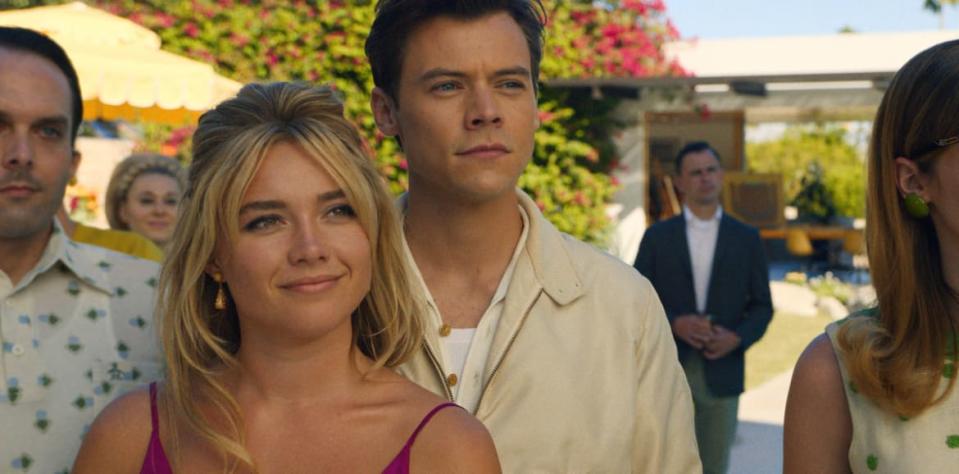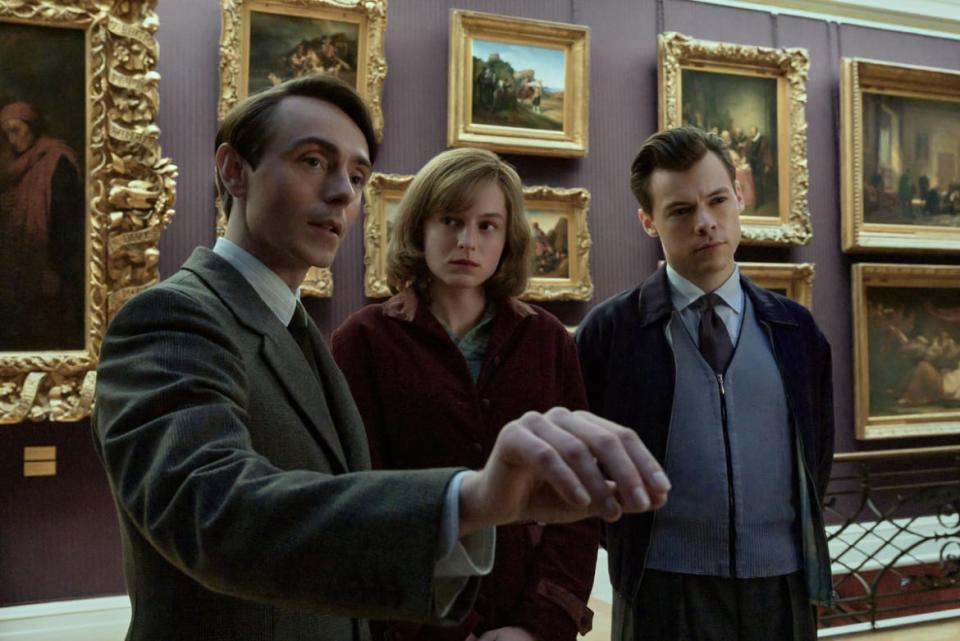It Turns Out Harry Styles Is Really Bad at Acting

- Oops!Something went wrong.Please try again later.
- Oops!Something went wrong.Please try again later.
It should be the season of Harry Styles at the movies. The boy band member turned global solo pop superstar is making a go at film stardom with not one but two lead roles in Oscar-baity movies out this fall. But, sorry stans. Harry may stun when grooving out on the stage of Madison Square Garden, but his work as an actor leaves something to be desired.
Styles' natural charisma as a performer—of which he has plenty—has not yet translated to his work on screen in either Olivia Wilde's Twilight Zone-y thriller Don't Worry Darling or the period romance My Policeman. It may be that he's just simply not really right for either of the roles in which he's been cast. Or he just doesn't have the chops to hold his own against performers like Oscar-nominated Florence Pugh and Emmy-nominated Emma Corrin.
Styles seems oddly uncomfortable on screen, ill at ease with the task of a different person, but also let down by the movies around him, which can't seem to figure out what to do with his presence. They are both too captivated by the idea of Harry Styles as Dream Man, even when the plots want him to embody human failures.
Styles has long felt like a throwback to a different era of musician, with the Beatles-aping antics of One Direction and dad-rock vibes of his solo career. In Don't Worry Darling he plays Jack Chambers, who, at least at first, seems like a perfect imitation of a midcentury husband: Looks great in a suit and loves his wife, but we know deep down he probably/definitely is a secret misogynist. While Wilde's film takes place in what is clearly a fake, vague version of the 1950s, My Policeman is a faithful interpretation of the era.

Based on Bethan Roberts' novel, the drama, directed by theater veteran Michael Grandage, finds Styles playing Tom Burgess, a closeted gay man working as a copper in 1950s Brighton. Jumping back and forth in time, the film tells the story from the dual perspective of Tom's wife, Marion, a schoolteacher played in youth by Emma Corrin, and his lover, Patrick, a museum curator portrayed by David Dawson. From Marion's viewpoint, the audience witnesses a tentative courtship between this heterosexual couple where Patrick, midway through, is introduced as an acquaintance who becomes a close friend to both. Patrick's diaries, meanwhile, reveal that they had begun an affair long before Tom brought them all together.
For those who are wondering: Yes, there are sex scenes between Styles and Dawson, which are intense, passionate, amd feature brief nudity, but are not nearly as groundbreaking as Styles misguidedly thought in his Rolling Stone cover story. (Someone get Styles in a queer cinema course stat.) Like the rest of the movie, they are hampered by the fact that it's hard to get a grasp on just who Tom is outside of being, well, Harry Styles. Both Marion and Patrick imply that this man with whom they are infatuated is handsome, but coarse; not unintelligent, but a person of simple interests who truly believes that he can do right as a police officer. Patrick even calls him "ordinary."
Harry Styles’ Acting Flops Again in ‘My Policeman’ at TIFF
The problem is: There's nothing that seems ordinary about Harry Styles. He never disappears into the character being described and loses the alluring impish spirit that makes him so good at his day job. (It's why he actually makes sense in his brief Marvel cameo as a space adventurer named Starfox.)
As Tom, Styles gets the charming part right, but can't capture the emotional turmoil of a man whose profession conflicts with his innermost desires. It's never clear why Tom feels so strongly about being a policeman or how he grapples his belief in the law with the fact that homosexuality is illegal in London. Tom is, in part, underdeveloped because we are only allowed to see him through the eyes of his lovers, but you're left wondering if they are so into him just because, well, he's Harry Styles, not the character he's meant to be playing. When he turns up the volume for the dramatic moments where he lashes out against his spouse, it seems put on, like Styles is thinking too hard about how angry he's supposed to be rather than actually feeling that anger.

Don't Worry Darling runs into a similar challenge. Jack, as expected, turns out to be a really bad guy, but the version of him that appears in flashbacks—a sort of parody of an incel captivated by a Jordan Peterson-type—never really meshes with the dude who loves to go down on his wife in their perfect development community. Styles has trouble mastering the nastiness that would be required to make Jack as revolting as he really should be, so instead he reads as more of an annoyance than a threat.
Look, I get it. It's easy to be charmed by Harry Styles. I once wrote a whole chapter of a book on why he's an "internet boyfriend." He's got those dimples; he makes fun music; he's welcoming to fans; and he's way more fashionable than most men. Don't Worry Darling and My Policeman try to use the natural appeal of the man who made "treat people with kindness" an anthem and subvert that, but fail at the latter. Styles isn't quite ready to shake off the veneer of likeability that has made him a success, and the movies he's in have just swooned too hard for him without considering how out of place he is in their worlds.
Get the Daily Beast's biggest scoops and scandals delivered right to your inbox. Sign up now.
Stay informed and gain unlimited access to the Daily Beast's unmatched reporting. Subscribe now.

